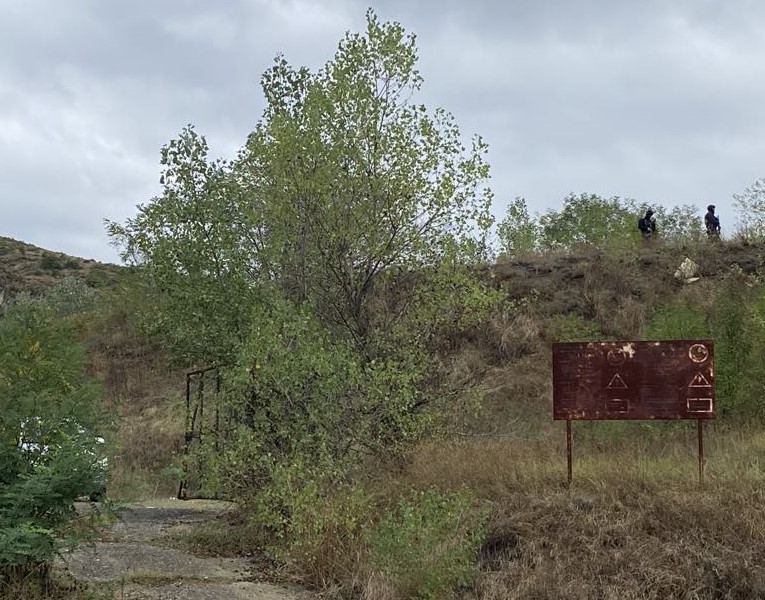Kosovo Police patrolling in Zveçan
*Prepared by: Fitim Gashi
Tensions between Kosovo and Serbia frequently shift from domestic situations to developments along the border, escalating disputes over territorial and security issues. A recent example of this dynamic is Serbia’s claim that Kosovo Police illegally crossed the border, which Kosovo labeled it as disinformation. Similarly, speculation following the Kosovo Security Force (KSF) taking control of the Dumosh Airport near the border with Serbia intensified accusations and threats, raising concerns about a potential escalation. These incidents illustrate a recurring approach where tensions are moved from internal matters to the border, keeping it at the center of contentious narratives.
Serbian President Aleksandar Vucic accused the Government of Kosovo of deliberately provoking Serbia and the Serbian community in the north of the country through police. He alleged that Kosovo police forces crossed the so-called “administrative line,” as officially termed by Serbia, during an operation near the border area in the village of Çirkoviq, Leposaviq.
“Kurti’s police forces are playing with fire. Their deliberate provocations not only destabilize the situation on the ground but are also an attempt to draw NATO into the conflict. This is an irresponsible and dangerous act,” Vucic said on Serbian public television. He even called on the United States to inform Serbia whether it agrees “that Kurti personally ordered the provocation and the entry of his armed forces into Serbian territory.”
“He expected these individuals to be liquidated, which would serve as a reason to involve NATO in a conflict with Serbia,” Vucic claimed. He warned of measures to, as he stated, protect the interests of Serbian citizens in the north, leaving open the possibility of retaliation in the event of further escalations.
“Next time, we will respond in accordance with the full rules of military engagement,” Vucic said.
Earlier, Serbia’s Ministry of Defense announced that Kosovo Police had crossed the “administrative line,” though it did not provide details on how many kilometers they had entered Serbian territory.
Policia e Kosovës hodhi poshtë pretendimet e zyrtarëve serbë për kalimin e vijës administrative, duke i cilësuar informata të rrejshme. Në një deklaratë të shpërndarë përmes rrjeteve sociale, nga PK-ja thanë se të gjitha operacionet i zhvillojnë brenda territorit të Kosovës dhe në përputhje të plotë me Kushtetutën dhe ligjet e vendit.
“The reports referenced in the announcement by Serbia’s Ministry of Defense are untrue and unfounded. Therefore, these reports and the announcement itself are disinformation aimed at creating insecurity among the residents of that area and tarnishing the work of the Kosovo Police,” the statement read.
This is not the first time the possibility of a Kosovo-Serbia conflict has been mentioned. Narratives about a potential war are often propagated during periods of heightened tensions between the two countries, while Kosovo has repeatedly denounced Serbia’s military buildup near the border. In June 2023, three Kosovo police officers were arrested at the border, with Serbia alleging they had crossed into its territory. After several days, the officers were released by Serbian authorities.
The length of the border between Kosovo and Serbia is approximately 350 kilometers, with over 50% of it passing through the four northern municipalities, which are predominantly inhabited by Serbs.
The force responsible for ensuring security around Kosovo's border, KFOR, has maintained a neutral stance regarding the claims made by Serbia's Ministry of Defense that Kosovo Police crossed the "administrative line." In its response, KFOR neither denied nor confirmed this claim, emphasizing that the situation along the Kosovo-Serbia border is calm and that they continue to monitor developments.
“We have a visible and flexible presence, and we are well-positioned to respond to any security scenario, in accordance with our long-standing mandate based on United Nations Security Council Resolution 1244 of 1999,” KFOR stated.
Another development that provoked a reaction from Serbia is the decision to place the Dumosh Airport, located in Podujevë, a border town with Serbia, under the control of the Kosovo Security Force (KSF). This airport, which previously served civilian needs, will be transformed into a strategic center for emergency operations and logistics. The Minister of Defense stated that this step strengthens the presence of the KSF in the Llap and Gollak regions, providing additional security for the residents of these areas, as well as adequate support for emergency responses and operations in the event of civil emergencies. Although he did not mention Serbia, Serbian analysts and politicians labeled it as another provocation against Serbian interests, raising concerns about the possibility of the airport being used for military operations due to its proximity to the border with Serbia.
Actions related to security and legality in northern Kosovo, according to authorities, are being carried out as part of efforts to consolidate sovereignty. However, international actors have stated on several occasions that this has impacted the prospects for normalizing relations, describing Kosovo's actions as unilateral.
In the face of these developments, NATO and the European Union remain key factors in maintaining stability. International representatives have called for restraint and a return to dialogue, emphasizing that the resolution of open issues should be pursued through diplomatic means.
Tensions between the two countries are directly affecting the dialogue between Kosovo and Serbia, which is facilitated by the European Union and supported by the United States.
The polarizing discourse is making it increasingly difficult to reach an agreement on the path forward for the implementation of the Brussels Agreement and the Ohrid Annex, which Kosovo and Serbia had agreed upon.
*This article is published as part of the Western Balkans Regional Initiative against disinformation. “Western Balkans Anti-Disinformation Hub: exposing malign influences through watchdog journalism.”



























































